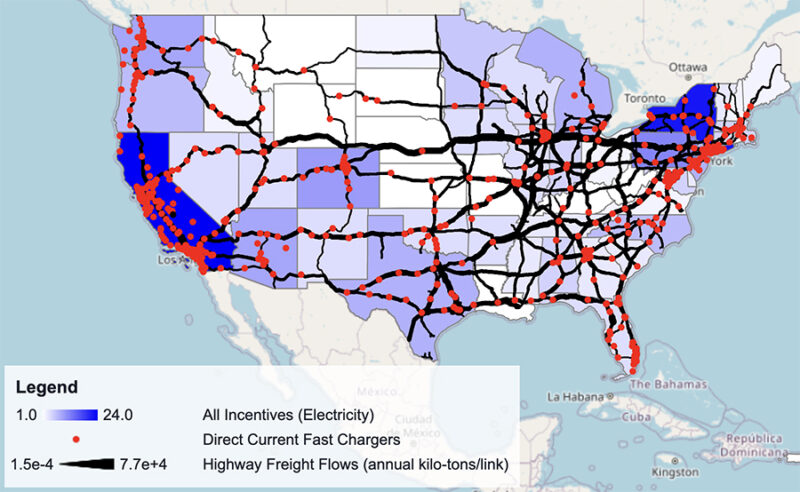Implementing Geo-TIDE for Data-Driven Decisions: New Technical Guide Explores Functionality and Case Studies
April 11, 2025

Snapshot of the Geo-TIDE tool.
Geo-TIDE is a tool that helps trucking industry stakeholders and fleet owners make data-driven decisions about where, when, and how to decarbonize their fleets by investing in low-carbon technologies. Developed by a team of researchers through the MCSC, the tool integrates public geospatial datasets such as regional freight flows, policy incentives, and spatially resolved cost and emissions models. The tool’s development is led by Danika Eamer, MCSC Impact Fellow, through a collaborative process with industry representatives and researchers across MIT. In a new technical guide, Eamer and co-authors Micah Borrero, Brooke Bao, Brilant Kasami, and Helena De Figueiredo Valente detail the tool’s functionality, showcase real-world usage scenarios, and explore the methodology behind its evolution and development.
“Since 2023, we’ve been developing Geo-TIDE in close collaboration with industry partners to shape it into a tool that supports and accelerates the adoption of low-carbon trucking solutions and infrastructure across the U.S.” said Eamer. “This technical guide brings together years of improvements and iteration to help decision-makers leverage the tool’s capabilities, while ensuring its underlying methodologies are clear and transparent.”

“This technical guide brings together years of improvements and iteration to help decision-makers leverage the tool’s capabilities, while ensuring its underlying methodologies are clear and transparent.”
Technical Updates with Student Support
The technical guide is co-authored by student researchers Micah Borrero, now a PhD candidate at the University of Michigan; Brooke Bao, Wellesley College; and Helena De Figueiredo Valente, MIT. Working with Eamer through MIT’s Undergraduate Research Opportunities Program, these students were central to many of the tool’s technical updates and case studies development. Through their work on the Geo-TIDE tool at the MCSC, they have had the opportunity to apply their academic work and expertise to a new side of sustainability.

Support from Researchers Across MIT
In developing the Geo-TIDE tool, Eamer worked with transportation experts at MIT, starting with Florian Allroggen, Executive Director of MIT’s Laboratory for Aviation and the Environment, who supported its early conception and prototyping. Allroggen’s research brings together transport, environmental, and energy economics – focusing on understanding the transition of transportation towards sustainable solutions, especially focusing on policy and market response to new technologies. This knowledge helped establish a strong direction and strategy for Geo-TIDE.
From MIT Chemical Engineering, graduate students Kariana Moreno Sader and Sayandeep Biswas, who work with Professor William Green, shared their expertise to inform an adaptation of the physics-based electric vehicle (EV) trucking model they developed with colleagues – recently – which is presented in the Geo-TIDE technical guide. Another important part of their work focuses on harnessing hydrogen’s potential to address long-haul trucking emissions and is supported by the MCSC (as a 2022 Seed Award project) as well as the MIT Energy Initiative.

Piloting the Tool with Industry
As the technical guide explains, the MCSC has piloted the tool with industry partners, introducing many new features in response to their feedback. For example, co-author and software developer Brilant Kasami worked on the development of a highly-requested secure data upload and overlay feature, in addition to supporting the tool’s integration into the MCSC’s DataHub platform.
“We look forward to welcoming new collaborators as we continue to improve Geo-TIDE,” Eamer concluded. “Our technical guide aims to inform users on the tool’s implementation opportunities, and invite feedback on future iterations, use-cases, and refinements.”
To learn more about the MCSC’s work in Transportation, watch this recent video.
